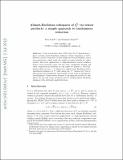Almost-Euclidean Subspaces of ℓ1N via Tensor Products: A Simple Approach to Randomness Reduction
Author(s)
Indyk, Piotr; Szarek, Stanislaw
DownloadIndyk_Almost-euclidean.pdf (171.8Kb)
OPEN_ACCESS_POLICY
Open Access Policy
Creative Commons Attribution-Noncommercial-Share Alike
Terms of use
Metadata
Show full item recordAbstract
It has been known since 1970’s that the N-dimensional ℓ[subscript 1]-space contains almost Euclidean subspaces whose dimension is Ω(N). However, proofs of existence of such subspaces were probabilistic, hence non-constructive, which made the results not-quite-suitable for subsequently discovered applications to high-dimensional nearest neighbor search, error-correcting codes over the reals, compressive sensing and other computational problems. In this paper we present a “low-tech” scheme which, for any γ> 0, allows us to exhibit almost Euclidean Ω(N)-dimensional subspaces of ℓ[subscript 1][superscript N] while using only N γ random bits. Our results extend and complement (particularly) recent work by Guruswami-Lee-Wigderson. Characteristic features of our approach include (1) simplicity (we use only tensor products) and (2) yielding almost Euclidean subspaces with arbitrarily small distortions.
Description
Proceedings of the 14th International Workshop, APPROX 2011, and 15th International Workshop, RANDOM 2011, Princeton, NJ, USA, August 17-19, 2011.
Date issued
2010-08Department
Massachusetts Institute of Technology. Department of Electrical Engineering and Computer ScienceJournal
Approximation, Randomization, and Combinatorial Optimization. Algorithms and Techniques 13th International Workshop, APPROX 2010, and 14th International Workshop, RANDOM 2010, Barcelona, Spain, September 1-3, 2010. Proceedings
Publisher
Springer-Verlag
Citation
Indyk, Piotr, and Stanislaw Szarek. “Almost-Euclidean Subspaces of ℓ1N via Tensor Products: A Simple Approach to Randomness Reduction.” Approximation, Randomization, and Combinatorial Optimization. Algorithms and Techniques. Ed. Maria Serna et al. (Lecture Notes in Computer Science Vol. 6302). Berlin, Heidelberg, 2010. 632–641.
Version: Author's final manuscript
ISBN
978-3-642-22934-3